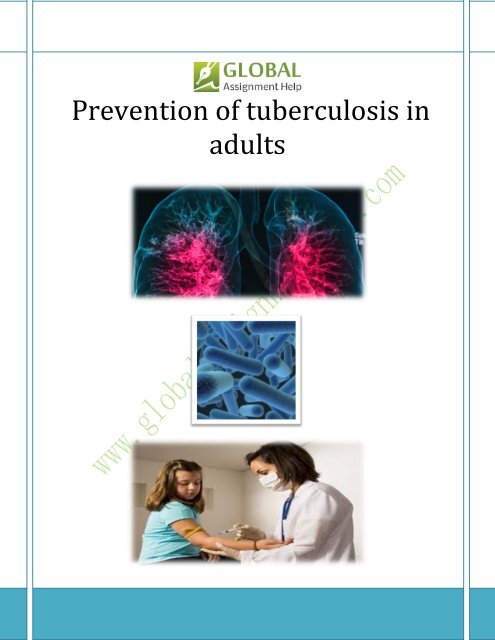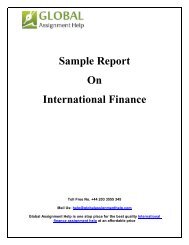Prevention Methods and Treatment for Tuberculosis Disease
Tuberculosis is highly infectious disease that has become a critical problem of today's world. Sample document by expert writers of Global Assignment Help present you about the overall infrastructure of Health Care services and its treatments methods to improve people conditions.
Tuberculosis is highly infectious disease that has become a critical problem of today's world. Sample document by expert writers of Global Assignment Help present you about the overall infrastructure of Health Care services and its treatments methods to improve people conditions.
Create successful ePaper yourself
Turn your PDF publications into a flip-book with our unique Google optimized e-Paper software.
<strong>Prevention</strong> of tuberculosis in<br />
adults
<strong>Tuberculosis</strong> acronymed as TB is an infectious disease caused by bacterial strain<br />
Mycobacterium tuberculosis. The disease majorly affects lung thereby causing pulmonary TB. It<br />
may influence other sites as well <strong>and</strong> in that case it is named as extra pulmonary TB.<br />
<strong>Tuberculosis</strong> is a contagious disease that spreads via air when the sick person expels out the<br />
microorganisms via coughing or even sneezing (Strategies <strong>for</strong> TB prevention, 2013). It is also a<br />
known fact that there is a presence of an increased probability of catching up TB if the individual<br />
is affected by human immunodeficiency virus (HIV) which is known to cause AIDS (Acquired<br />
Immuno Deficiency Syndrome). The onset of the disease is more common in the male<br />
population as compared to the female counterpart (M<strong>and</strong>al, 2013). The reason behind this<br />
behavior is not understood <strong>and</strong> requires further research to identify the risk factors that make<br />
males more prone to TB. It is also found to affect adults that lie in the economically productive<br />
sections of society (How to Prevent <strong>Tuberculosis</strong> <strong>and</strong> its Spread, 2013). The age group is in the<br />
range of 15 to 59 years.<br />
<strong>Tuberculosis</strong> is considered as a major health problem that is affecting the whole world.<br />
According to statistical figures, an estimated 8.5 to 9.2 cases have been reported in the year<br />
2010. Among the given lot, the death accounted <strong>for</strong> 1.2 to 2.5 million (Kaye, 2011). This is a<br />
reflection that TB is now considered to be the second largest killer amongst all infectious disease<br />
after HIV. Moreover, the crucial link between HIV <strong>and</strong> TB makes the case more severe. Hence,<br />
there is an urgent need to undertake prevention measures to avoid spread of this deadly menace<br />
to healthy individuals of society (What Is <strong>Tuberculosis</strong>? What Causes <strong>Tuberculosis</strong>, 2009). Great<br />
strides have been undertaken by the government of various nations which has reduced the impact<br />
of disease to a great extent. However, the disease is far away from complete control. The given<br />
essay thus revolves around prevention of <strong>Tuberculosis</strong> in adult population who are more prone<br />
toward the disease. It also reflects on the presence of issues that are impacting with preventing<br />
TB (Wormser, 2004).<br />
This is a sample on<br />
<strong>Prevention</strong> of <strong>Tuberculosis</strong> in Adults<br />
<strong>for</strong> complete Assignment writing services Kindly,<br />
contact us at:<br />
+44 203 3555 345<br />
Score A+ grade in assignment writing easily. For any assignment help feel free to contact Global<br />
Assignment Help expert writers anytime.
The prevention of TB is highly neglected due to presence in latent <strong>for</strong>m as well as active<br />
<strong>for</strong>m. The most vulnerable among the two is the latent stage. Here, the individuals do not feel<br />
sick <strong>and</strong> also are devoid of symptoms that is an essential condition to mark the physical presence<br />
of TB (Barrett <strong>and</strong> Stanberry, 2009). It is important to take care that individuals at this stage are<br />
infected by the bacterial strain of <strong>Tuberculosis</strong> but are yet to develop TB disease. The only sign<br />
that indicates the presence of TB is existence of a positive reaction <strong>for</strong> TB blood test also named<br />
as tuberculin skin test. It is also a known fact that latent TB individuals do not bear the potential<br />
to spread the disease to others (Gantz, 2004). It is only in a very few cases, where the latent stage<br />
of <strong>Tuberculosis</strong> may lead to development of disease that also bears the potential to kill victim. It<br />
is this absence of symptoms as well as subsequent lack of infection that makes individual <strong>for</strong> not<br />
adhering towards the treatment mechanism (O'Boyle <strong>and</strong> O'Boyle, 2012). <strong>Tuberculosis</strong> is<br />
majorly concentrated among the vulnerable population including migrants from countries which<br />
are endemic with TB, socially marginalized individuals, drug users, prisoners, HIV infectants,<br />
poor population <strong>and</strong> many more (Younger, 2010). A slight exposure to these individuals who are<br />
suffering from TB can make individual prone towards the development of disease due to its<br />
highly contagious nature.<br />
The prevention of TB takes place in two parts. In the first segment, the key is to stop the<br />
transmission of TB from diseased to healthy individual. This can take place by identification of<br />
patients that are suffering from the malaise (whether in latent or active <strong>for</strong>m) <strong>and</strong> then curing the<br />
disease by proper treatment mechanism (Goodier, 2010). It is only by appropriate management<br />
of TB, there will be absence of rapid reach towards infection thereby causing a potential to avoid<br />
the spread of disease to others. The second segment towards TB prevention lies in preventing<br />
people with latent TB from developing active as well as infectious <strong>for</strong>m of <strong>Tuberculosis</strong> disease<br />
(Marfin, 2012). This can be achieved by intake of medications <strong>for</strong> a fixed duration of time.<br />
Score A+ grade in assignment writing easily. For any assignment help feel free to contact Global<br />
Assignment Help expert writers anytime.
In the fight against tuberculosis <strong>and</strong> with a view <strong>for</strong> curbing the disease, World Health<br />
Organization (WHO) recommends the usage of Bacilli Calmette- Guérin (BCG) vaccination.<br />
This is an urgent requirement in those countries who are heavily burdened by high incidences of<br />
TB. The vaccine is found to contain a weakened <strong>for</strong>m of Mycobacterium tuberculosis. The given<br />
bacterial strain is made to enter in the body via vaccine in a controlled amount so as to help in<br />
the induction of antibodies in human being that helps in fighting of the bacteria. There is a<br />
presence of huge variation with respect to the efficacy of vaccine that ranges from 0% to 84%.<br />
The drastic difference is on account of frequency towards TB exposure as well as the quality of<br />
vaccine that has been made the part of treatment regime (Versteynen <strong>and</strong> Huisingh, 2012). There<br />
has been presence of many arguments against the BCG vaccine. It is found to induce positive<br />
reactions to tuberculin skin testing thereby registering an interference with diagnosis of latent<br />
TB. In past the BCG vaccine was given on patients with some success especially in the<br />
developing nations. There was a presence of great ignorance among the government of these<br />
countries with respect to serious consequences of the same (Ahmad, 2012). But still it has been<br />
considered as one of the major discoveries towards the prevention of disease.<br />
This is a sample on<br />
<strong>Prevention</strong> of <strong>Tuberculosis</strong> in Adults<br />
<strong>for</strong> complete Assignment writing services Kindly,<br />
contact us at:<br />
+44 203 3555 345<br />
help@globalassignmenthelp.com<br />
<strong>Tuberculosis</strong> drug treatment is also a part of prevention which is <strong>for</strong>mally known as<br />
chemoprophylaxis. It can help in reduction of the risk associated with TB in people that have<br />
been exposed to the infection or are affected by latent TB. It can play a significant role <strong>for</strong><br />
reducing the recurrence of TB episode (Dye, Watt, Bleed <strong>and</strong> Williams, 2003). In this respect,<br />
Score A+ grade in assignment writing easily. For any assignment help feel free to contact Global<br />
Assignment Help expert writers anytime.
WHO recommends the intake of drug <strong>for</strong> a period ranging from six weeks to nine years.<br />
Currently the TB chemotherapy is composed of first-line drugs that are inclusive of isoniazid,<br />
ethambutol, rifampicin <strong>and</strong> pyrazinamide. In the initial phase, treatment with the above<br />
mentioned drug is advisable with an underlying aim <strong>for</strong> eradicating or controlling the spread of<br />
bacterial strain by replication via a rapid motion (Brown, 2004). It also involves avoidance of<br />
emergence with respect to bacteria resistance which is regarded as the new issue in the world.<br />
There is also a presence of underlying issue with the intake of drug. The problem is that these<br />
drugs are usually administrated to latent TB sufferers who are devoid of the symptoms<br />
(Halberstein, 2011). Hence, the patients are usually found to leave the intake of these heavy<br />
medicines without the completion of course. Moreover, these drugs are also found to cause side<br />
effects ranging from joint <strong>and</strong> muscular pain, bodily rashes, tiredness <strong>and</strong> altered sensory<br />
perception among a few (Ferrari, 2004).<br />
The widespread impact of the disease as well as the availability of new technologies<br />
increased the requirement to prevent tuberculosis in adults by implementation of TB control<br />
policy. This is based on the detection of maximum number of patients followed by their cure.<br />
Curing the disease is a major step towards prevention of TB. In this respect, there has been a<br />
utilization of Directly Observed <strong>Treatment</strong> Strategy (DOTS). Under this prevention measure <strong>for</strong><br />
adults, the strategy is particularly essential to make the patients adhere towards the drug intake<br />
which is a growing issue in the direction of effective treatment (Coleman, 2009).<br />
Here, the treatment to each patient is administrated by health professional directly. This<br />
happens on a daily/ alternate basis or according to requirement of drug intake. This strategy has<br />
been made sure to undertake effective prevention of TB from infected to healthy individuals.<br />
This helps in reaching the rural masses, evaluation of relapsed <strong>and</strong> new cases, treatment failure<br />
<strong>and</strong> severity of TB etc (Adorno, 2012).<br />
There is also a need to undertake prevention measures <strong>for</strong> transmission of <strong>Tuberculosis</strong> in<br />
households. This is very essential in those homes where an individual is affected by<br />
<strong>Tuberculosis</strong>. In that case, there is a need to keep houses properly ventilated. If coughing is<br />
observed in unaffected individuals then they must be educated <strong>for</strong> proper cough etiquette as well<br />
as respiratory hygiene (Strategies <strong>for</strong> TB prevention, 2013). This in inclusive of covering ones<br />
nose <strong>and</strong> mouth while sneezing or coughing. This can take place via usage of tissue paper or<br />
sneezing in upper sleeve or elbow. Coughing in h<strong>and</strong>s should be avoided completely. This<br />
Score A+ grade in assignment writing easily. For any assignment help feel free to contact Global<br />
Assignment Help expert writers anytime.
should be followed by safe disposable of tissue paper once it has been utilized rather than using<br />
it again <strong>and</strong> again. If someone is tested as smear positive, then the need is to spend the maximum<br />
possible time in open environment. This should be followed by sleeping alone in a separate room<br />
which also has a provision <strong>for</strong> adequate ventilation (How to Prevent <strong>Tuberculosis</strong> <strong>and</strong> its Spread,<br />
2013). The infected cases must spend the minimum possible time on public transport so as to<br />
avoid the spread of bacterial strain. This should be followed by less attending of social<br />
gatherings where people accumulate in large numbers.<br />
<strong>Tuberculosis</strong> is becoming an ever increasing threat <strong>for</strong> health care facilities that are in<br />
maximum contact with the bacterial strains. In this respect, there is a need to prevent the disease<br />
by usage of basic techniques as well as new technology. In 2012, there has been a reported case<br />
in UK. According to the case, a patient became infected with TB <strong>and</strong> died on account of sitting<br />
close to a <strong>Tuberculosis</strong> infected patient while undergoing his kidney dialysis. In this regard, it is<br />
advisable that healthcare, hospitals, laboratories as well as treatment centers that are exposed to<br />
TB patients (Barrett <strong>and</strong> Stanberry, 2009). In this respect, there is a requirement <strong>for</strong> st<strong>and</strong>ard<br />
ventilation, purification of air <strong>and</strong> other filtration mechanism to curb the spread of tuberculosis.<br />
The nurses, health care staff, laboratory people <strong>and</strong> physicians must use a microfiltration mask<br />
while undergoing interaction sessions with patients. They must also take care of all aspects<br />
related to personal hygiene so as to protect themselves from catching the disease. Various<br />
environmental control measures can also be utilized by the health care providers. In the primary<br />
approach, there can be a usage of control source of infection by using local exhaust ventilation<br />
along with dilution <strong>and</strong> removal of contaminated air via use of general ventilation system<br />
(Versteynen <strong>and</strong> Huisingh, 2012). In the area of secondary control measures, there can be<br />
prevention of contamination of air via use of high efficiency particulate air also known as HEPA.<br />
Other than this, filtration by ultraviolet germicidal irradiation can also be utilized.<br />
According to view point’s given by Ch<strong>and</strong>ler, 2010, <strong>Tuberculosis</strong> can also be prevented<br />
by strengthening the overall health system that requires <strong>for</strong> active participation by <strong>for</strong>mulation of<br />
policies, integration of health care workers, service delivery process as well as usage of<br />
in<strong>for</strong>mation system technology. In this respect, the onset of <strong>Tuberculosis</strong> infection in healthy<br />
individuals is also required to be prevented. This can take place via encouraging the health care<br />
workers to refer individuals in where signs <strong>and</strong> symptoms of TB is seen <strong>for</strong> the purpose of<br />
specialist consultation. Special TB practitioners should be made available that are in liaison with<br />
Score A+ grade in assignment writing easily. For any assignment help feel free to contact Global<br />
Assignment Help expert writers anytime.
general practitioners <strong>and</strong> others involved (Parija., 2009). Administration measures must also be<br />
undertaken by assigning the designated staff with the responsibility to conduct infection control.<br />
A risk assessment facility must also be <strong>for</strong>mulated by writing a control plan. This should be<br />
followed by implementation of effective work practices <strong>for</strong> detection <strong>and</strong> management of clients<br />
who are seen with signs <strong>and</strong> symptoms that may further indicate development towards active TB<br />
stage. A respiratory protection program should also be established by providing training, testing<br />
<strong>and</strong> evaluation of usage related to respiratory equipments (Murray, 2004).<br />
A <strong>Tuberculosis</strong> screening protocol can also be implemented <strong>for</strong> clients that are presented<br />
with cough or other TB symptoms. The screening tool must be in a position to determine<br />
duration of cough, presence of blood in sputum, night sweats, weigh loss in an unexplained<br />
manner, history of TB as well as exposure to infection (Ormerod, 2000). In case of positive<br />
screening the related procedures must be undertaken with complete certainty. It must also be<br />
taken care that the positively screened patients are adhering with the treatment regimes with<br />
respect to intake of medicines <strong>for</strong> specified duration of time. For improving the adherence, there<br />
is an urgent need to counsel them <strong>for</strong> the process (Long, 2000). They must be made to<br />
underst<strong>and</strong> about duration of medications, side effects etc. This will help in solving the potential<br />
issues that are linked with treatment of disease. Techniques are also required to be developed in<br />
the area of drug resistant strains of bacteria which are showing a widespread increase with<br />
passing time. Along with this there is a presence of urgent requirement to ensure proper as well<br />
as speedy diagnosis of TB with a view to prevent the acute spread of microorganisms. Hence<br />
proper research <strong>and</strong> development measures followed by market study are one of the most basic<br />
steps to help in complete prevention of the disease.<br />
<strong>Prevention</strong> of any ailment is possible only if there is a presence of enough awareness in<br />
people about the disease. To individuals residing in many countries like America, TB may seem<br />
to be an obscure disease i.e. the one which was one tested during employment or in schools. But,<br />
<strong>for</strong> some nations like Africa, Pakistan etc. the infection from tuberculosis is a real threat. In this<br />
regard, <strong>for</strong> preventing TB among the adult population requires educational measures (Knight,<br />
2011). This should be related to spread of disease via overcrowding, coughing etc. The<br />
awareness about the disease would play a rapid role to help individuals <strong>for</strong> undertaking<br />
precautions <strong>and</strong> rapid procedures related to treatment (Waller, 2002). The awareness should also<br />
Score A+ grade in assignment writing easily. For any assignment help feel free to contact Global<br />
Assignment Help expert writers anytime.
e spread among high risk groups inclusive of migrants, prison population, factory workers, staff<br />
in hospitals, police <strong>for</strong>ce as well as armed <strong>for</strong>ces.<br />
Along with this, most of the nations in the world are also observing world TB day which<br />
is an international day of awareness sponsored by Stop TB Partnership. This occasion helps in<br />
bringing the attention of world towards this deadly illness. World Health Organization has also<br />
developed a stop TB strategy as a part of global campaign to stop <strong>Tuberculosis</strong>. Along with this<br />
many countries ranging from United States, Mexico, <strong>and</strong> Ug<strong>and</strong>a etc. have <strong>for</strong>mulated a National<br />
Stop TB Partnership (Rook, Zumla <strong>and</strong> Dheda, 2005). They are working towards addressing the<br />
malaise of TB within the own nations. They are also finding better ways to control the disease<br />
<strong>and</strong> help in putting an end to this global problem. All the above mentioned programs should seek<br />
appropriate amount of funds <strong>for</strong> controlling the activities related to <strong>Tuberculosis</strong>. The agencies<br />
should be inclusive of federal, local, private <strong>and</strong> state level sources (Moverman, Daftary, Franks<br />
<strong>and</strong> Colson, 2008). They must work in collaboration with local firms like medical societies, lung<br />
associations <strong>and</strong> TB coalition members <strong>for</strong> educating the policy makers in the direction of<br />
preventing the TB followed by its subsequent eradication.<br />
There is also a need to design appropriate laws, regulations as well as policies to ensure<br />
consistency in the recommended medical <strong>and</strong> public health practices. Laws must be designed <strong>for</strong><br />
ensuring a m<strong>and</strong>atory reporting of suspected individuals followed by complete protection with<br />
respect to identity of patient. Rapid laboratory examination of the specimen is also required. This<br />
should be followed by treating of individuals <strong>for</strong> free who are not in a condition to af<strong>for</strong>d the<br />
treatment regime (Dye, Watt, Bleed <strong>and</strong> Williams, 2003). In some cases monetary incentives can<br />
also be given to individuals <strong>for</strong> making them adhere with the medications which are usually<br />
avoided on account of their long duration <strong>and</strong> associated side effects. A good link is also found<br />
between TB <strong>and</strong> HIV. Hence, the prevention requires <strong>for</strong> counseling <strong>and</strong> antibody testing of HIV<br />
patients. This is urgently needed in those geographic areas that suffer from high prevalence of<br />
HIV infection.<br />
Other than all the given measures it is best <strong>for</strong> concentrating on building of immunity. It<br />
is considered as a good means <strong>for</strong> prevention of tuberculosis as the bacterial strain is prone to<br />
weaken the immune system. Hence in this respect, it is advisable to staying fit <strong>and</strong> healthy,<br />
following a balanced diet full of nutrient intake; regular exercise regime can help in prevention<br />
of tuberculosis in healthy adult population. Avoidance of tobacco <strong>and</strong> alcohol intake is regarded<br />
Score A+ grade in assignment writing easily. For any assignment help feel free to contact Global<br />
Assignment Help expert writers anytime.
as one of the most powerful factors <strong>for</strong> strengthening the immune system. This has been<br />
recognized as by far the best way <strong>for</strong> prevention of tuberculosis. Usage of herbal antibiotic such<br />
as garlic <strong>and</strong> other herbs are also advisable in this regard (Morrison, Pai <strong>and</strong> Hopewell, 2008).<br />
This is a sample on<br />
<strong>Prevention</strong> of <strong>Tuberculosis</strong> in Adults<br />
<strong>for</strong> complete Assignment writing services Kindly,<br />
contact us at:<br />
+44 203 3555 345<br />
help@globalassignmenthelp.com<br />
From the above essay, it can be concluded that <strong>Tuberculosis</strong> is one of the most infectious<br />
disease that is acting as a big challenge <strong>for</strong> health practitioners in the whole world. Hence, there<br />
is an increased requirement to prevent this disease in a most efficient manner. In this respect, the<br />
prevention of tuberculosis is not possible unless the affected population receives proper<br />
treatment process (O'Boyle <strong>and</strong> O'Boyle, 2012). The priority in this respect is early detection as<br />
well as treatment of active cases. Sustained ef<strong>for</strong>ts are also required by health care professionals<br />
<strong>for</strong> treating the disease. The most urgent need is the commitment of people by educational <strong>and</strong><br />
awareness programs to vulnerable <strong>and</strong> risky groups of population. It should also be inclusive of<br />
combined ef<strong>for</strong>ts from governmental bodies of all the nations to work in complete collaboration<br />
with each other. The aim is to bring an overall improvement in health infrastructure of the world.<br />
Score A+ grade in assignment writing easily. For any assignment help feel free to contact Global<br />
Assignment Help expert writers anytime.
References<br />
Books <strong>and</strong> Journals<br />
Adorno, R. C. F., 2012. Theorizing about the other. Vulnerable groups <strong>and</strong> strategies <strong>for</strong> social<br />
inclusion in public health policies: a brief account of Brazilian case. International Journal of<br />
Migration, Health <strong>and</strong> Social Care. 8(1). pp.4 – 11<br />
Ahmad, M., 2013. Health care access <strong>and</strong> barriers <strong>for</strong> the physically disabled in rural Punjab,<br />
Pakistan. International Journal of Sociology <strong>and</strong> Social Policy. 33(3/4). pp.246 – 260.<br />
Barrett, A. D., <strong>and</strong> Stanberry, L. R., 2009. Vaccines <strong>for</strong> Biodefense <strong>and</strong> Emerging <strong>and</strong> Neglected<br />
<strong>Disease</strong>s. Academic Press.<br />
Brown, H., 2004. WHO identifies drug-resistant tuberculosis “hotspots”. The Lancet. 363 (9413).<br />
Pp. 951.<br />
Coleman, K. J., 2009. Learning about loss within a health education program. Health Education.<br />
109(1). pp. 9 - 24<br />
Dye, C., Watt, C., Bleed, D. <strong>and</strong> Williams, B., 2003. What is the limit to case detection under the<br />
DOTS strategy <strong>for</strong> tuberculosis control? <strong>Tuberculosis</strong>. 83 (1/3). Pp. 35-43.<br />
Ferrari, M., 2004. Eleven million adults co-infected with AIDS, TB. The Canadian Medical<br />
Association. 171 (5). Pp. 437.<br />
Gantz, L, M., 2006. Manual of Clinical Problems in Infectious <strong>Disease</strong>s. Lippincott Williams &<br />
Wilkins.<br />
Goodier, J., 2010. Emerging Biological Threats: A Reference Guide. Reference Reviews. 24(8).<br />
pp.39 – 40<br />
Halberstein, R., 2011. Epidemiological profile of an urban immigrant population. International<br />
Journal of Migration. Health <strong>and</strong> Social Care. 7(4). pp.174 – 181<br />
Kaye, K., 2011. Infection <strong>Prevention</strong> <strong>and</strong> Control in the Hospital, An Issue of Infectious <strong>Disease</strong><br />
Clinics. Elsevier Health Sciences.<br />
Knight, D. C., 2011. Robert Koch: Father of Bacteriology. Literary licensing.<br />
Long, R., 2000. Drug-resistant <strong>Tuberculosis</strong>. Canadian Medical Association Journal. 163(4).<br />
pp.425-428.<br />
Marfin, A. T., 2012. Public health implications of healthcare-associated infections: Problems <strong>and</strong><br />
prospects. Clinical Governance: An International Journal. 17(2). pp.101 – 108<br />
Score A+ grade in assignment writing easily. For any assignment help feel free to contact Global<br />
Assignment Help expert writers anytime.
Morrison, J., Pai, M., <strong>and</strong> Hopewell, P.C., 2008. <strong>Tuberculosis</strong> <strong>and</strong> latent tuberculosis infection in<br />
close contacts of people with pumonary tuberculosis in low-income <strong>and</strong> middle-income<br />
countries: a systematic review <strong>and</strong> meta-analysis. Lancet Infect Dis. 8. Pp. 359–68.<br />
Moverman, Y. H., Daftary, A., Franks, J., <strong>and</strong> Colson, P. W., 2008. Adherence to treatment <strong>for</strong><br />
latent tuberculosis infection: systematic review of studies in the US <strong>and</strong> Canada.<br />
International Journal of <strong>Tuberculosis</strong> <strong>and</strong> Lung <strong>Disease</strong>. 12(11). Pp. 1235-1254<br />
Murray, J. F., 2004. A Century of <strong>Tuberculosis</strong>. The American Journal of Respiratory <strong>and</strong><br />
Critical Care Medicine. 169(11). pp. 1181-1186.<br />
O'Boyle, E., <strong>and</strong> O'Boyle, M., 2012. Global poverty, hunger, death, <strong>and</strong> disease. International<br />
Journal of Social Economics. 39(1/2). pp.4 – 17<br />
Ormerod, L. P., 2000. Control <strong>and</strong> prevention of <strong>Tuberculosis</strong> in the United Kingdom: Code of<br />
Practice 2000. Thorax.55(11). pp.887-901.<br />
Parija., 2009. Textbook of Microbiology & Immunology. Elsevier India.<br />
Rook, G. A. W., Zumla, A., <strong>and</strong> Dheda, K., 2005. Immune responses to tuberculosis in<br />
developing countries: implications <strong>for</strong> new vaccines. Nature Reviews Immunology. 5(1). pp.<br />
661-667<br />
Versteynen, L., <strong>and</strong> Huisingh, D., 2012. Sustainable solutions <strong>for</strong> “global access to medicines”<br />
problems. Journal of Global Responsibility. 3(2). pp.208 – 223.<br />
Waller, J., 2002. The Discovery of the Germ: Twenty-Five Years that Trans<strong>for</strong>med the Way We<br />
Think About <strong>Disease</strong>. New York: Columbia University Press.<br />
Wormser, G., 2004. AIDS <strong>and</strong> Other Manifestations of HIV Infection. Academic Press.<br />
Younger, P., 2010. Human <strong>Disease</strong>s <strong>and</strong> Conditions. Reference Reviews. 24(7). pp.40 – 41<br />
Online references<br />
How to Prevent <strong>Tuberculosis</strong> <strong>and</strong> its Spread. 2013. [Online]. Available through:<br />
. [Accessed on 10 th<br />
April 2013].<br />
M<strong>and</strong>al, A., 2013. <strong>Tuberculosis</strong> <strong>Prevention</strong>. [Online]. Available through: .<br />
[Accessed on 10 th April 2013].<br />
Strategies <strong>for</strong> TB prevention. 2013. [Online]. Available through: .<br />
[Accessed on 10 th April 2013].<br />
Score A+ grade in assignment writing easily. For any assignment help feel free to contact Global<br />
Assignment Help expert writers anytime.
<strong>Tuberculosis</strong> (TB Alert). n.d. [Online]. Available through: <<br />
http://www.patient.co.uk/health/<strong>Tuberculosis</strong>-(TB-Alert).html>. [Accessed on 10 th April<br />
2013].<br />
<strong>Tuberculosis</strong>: an imported epidemic. n.d. [Online]. Available through:<br />
. [Accessed on 10 th<br />
April 2013].<br />
What Is <strong>Tuberculosis</strong>? What Causes <strong>Tuberculosis</strong>. 2009. [Online]. Available through:<br />
. [Accessed on 10 th April 2013].<br />
Score A+ grade in assignment writing easily. For any assignment help feel free to contact Global<br />
Assignment Help expert writers anytime.
















